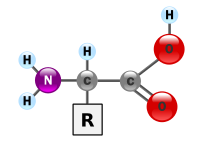
Photo from wikipedia
Diets that are high in protein have the ability to keep an individual feeling fuller for longer and therefore have the possibility of reducing food intake compared to diets high… Click to show full abstract
Diets that are high in protein have the ability to keep an individual feeling fuller for longer and therefore have the possibility of reducing food intake compared to diets high in other macronutrients. The aim of this research is to describe how a manipulation in dietary protein over 36hrs affects whole body energy expenditure, hunger and satiety in a cohort of healthy normal weight participants. Eight healthy participants (5 female, 3 male) attended the NIHR/Clinical Research Facility in Cambridge for 36hr measurements of energy expenditure (EE), hunger and satiety. Hunger and satiety were assessed by visual analogue scales (VAS) across two visits, a high protein (HP) visit and an energy balanced (EB) visit. EE was assessed by whole-body room indirect calorimetry. The EB visit consisted of meals containing 15 % protein, 30-35 % fat and 50-55 % CHO. The HP visit consisted of meals containing an extra 30 % of energy as protein. The VAS measurements demonstrated that on average hunger was significantly less during the HP visit compared to the EB visit and satiety was significantly greater during the HP visit compared to the EB visit (P < 0.0001). Figure 1 presents results from VAS for satiety across the two interventions. Total EE for the HP visits were significantly higher compared to the EB visits (6.07 ± 3.58 kJ/min vs 5.81 ± 3.42 kJ/min, P < 0.0001).
Journal Title: Proceedings of the Nutrition Society
Year Published: 2018
Link to full text (if available)
Share on Social Media: Sign Up to like & get
recommendations!